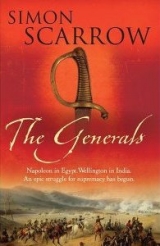
Текст книги "The Generals"
Автор книги: Simon Scarrow
сообщить о нарушении
Текущая страница: 45 (всего у книги 45 страниц)
Author’s note
One of the most fascinating aspects of writing this series has been recreating the origins of two of history’s greatest generals: where they came from, what their background was and how their historical context helped determine their characters and defined the opportunities open to them. The Generalscovers that vital part of their careers where Bonaparte and Wellesley learned their craft as commanders of armies. And what formidable armies they proved to be!
The men that Napoleon encountered when he arrived in Italy were hungry, sick, poorly equipped and unpaid, and outnumbered by a better-armed and better-trained enemy. Yet, like Robert E. Lee’s Army ofVirginia, they won tremendous victories because they marched and fought harder than their enemy, and had a terrific sense of elan besides. For this they had Napoleon to thank. Right from the outset he knew what motivated men and made every effort to win their respect. He made sure that good service and bravery were rewarded, and he tolerated a level of informality with his men that warmed their hearts and made them identify with his military goals, and ultimately his political ambitions.
By contrast, Wellesley was an utter professional who quickly grasped that relentless training and preparation would provide him with an army that would stand firm in the face of far larger enemy forces. When the British troops closed with the enemy their discipline and training completely outclassed their opponents, with the result that a handful of Europeans were left the masters of India by the time the Wellesley brothers quit the subcontinent. While Napoleon was a shrewd leader of men, Wellesley was a master of every detail of supply and manoeuvre, on the battlefield as well as off it.
It is important when considering their careers not to lose sight of the different circumstances in which each man sought advancement. Napoleon was very fortunate to be in Paris at the time of the royalist uprising. That made him a reputation he was quick to exploit. Indeed, he wore good fortune like a second skin in his meteoric rise to the rank of First Consul. For Wellesley, mired in a far less flexible political and military context, the prospects for promotion were much more limited than his great rival’s – at least until he arrived in India where British ambitions to extend the influence of the East India Company at last provided him with the chance to experiment with and perfect his ideas about generalship. His natural flair, and tireless dedication to his calling, were soon appreciated by his superiors who often manipulated the rigid rules of military precedence to secure him a commander’s role in the campaigns in which he fought. Unlike the fiery Napoleon, Wellesley was the embodiment of calm collected command, as his officers and men frequently commented in reports and letters home.
With Napoleon now master of France and a formidable power within Europe, and Wellesley the hero of India, the stage is set for each man to carve out his place in history. While Napoleon seeks to make France the undisputed power in Europe, Arthur is just as strongly resolved to defeat France and save his nation from the chaos and bloodshed of revolutionary ideals.
For those who wish to flesh out their knowledge of the background to The GeneralsI thoroughly recommend the following titles. David Chandler’s compendious The Campaigns of Napoleonprovides detailed accounts of the campaigns and battles and a fascinating analysis of Napoleon and his methods. There are ample maps and diagrams to permit the reader to follow the action and some sound judgements about Napoleon’s motives and ambitions. For Wellesley, I would recommend Jac Weller’s Wellington in India. Again, it is a detailed and racy account of the young British officer’s rise to fame as he develops a successful means of waging war across India that had eluded all his predecessors.Weller is one of those historians who has walked the ground and his book is a useful guide to anyone who wishes to explore the battlefields in person. For a wonderful appreciation of the experiences of the British military in India I heartily recommend the delightful Sahibby Richard Holmes. Finally, an honourable mention must go to Paul Strathern for his excellent upcoming work on Napoleon in Egypt, a proof of which unfortunately arrived just after I had completed this book.
I’ll conclude with the usual caveat. While The Generalsis a work of fiction I have made every effort to be faithful to the facts. However, there are occasions when I have had to bend the history and tweak time to make the story work. I apologise to the purists for this, but I wanted to share my excitement about these two towering historical figures in as pacy and readable a way as possible. They lived in extraordinary times and were both extraordinary individuals, and it is those aspects that I wanted to do full justice to in this book.
Simon Scarrow
January 2007
THE GENERALS
SIMON SCARROW
headline
www.headline.co.uk








